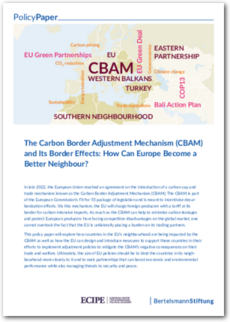The paper on the Carbon Border Adjustment Mechanism (CBAM) marks the inception of a series consisting of five papers, crafted in collaboration with the Brussels-based think tank ECIPE. In each paper we will evaluate the costs arising from the extra-territorial impact of EU internal market regulations on neighbouring regions engaging in trade with the EU. Central to our exploration is the proposition of means to alleviate this regulatory burden for the neighbourhood. Our aim is to provide a sharper perspective on the implications of the “Brussels Effect” on the EU’s neighbourhood during this era of escalating geopolitical tensions.
Accordingly, the CBAM paper explores how countries in the EU’s neighbourhood are being impacted by the CBAM as well as how the EU can design and introduce measures to support these countries in their efforts to implement adjustment policies to mitigate the CBAM’s negative consequences on their trade and welfare.
The countries analysed include the Western Balkans (Albania, Bosnia and Herzegovina, Montenegro, North Macedonia, Serbia, Kosovo) and Turkey, the Eastern Partnership (Armenia, Azerbaijan, Belarus, Georgia, Moldova, and Ukraine), and the Southern Neighbourhood (Algeria, Egypt, Israel, Jordan, Lebanon, Libya, Morocco, Palestine, Syria, and Tunisia).





